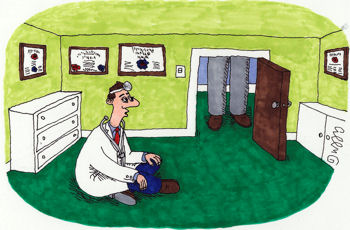Editor's Note: Family ties help close the generation gap
Washington, D.C., is lending not just a location but also a theme to many of the offerings at Internal Medicine 2008.
When Lawrence Smith, FACP, was a medical resident in the 1970s, it was commonly assumed among his peers that getting ahead required long hours and hard work, often at the expense of a personal life. But many younger physicians—including his son—don't share that baby boomer mentality as they instead try to achieve work-life balance and collaborative relationships with colleagues.
Fortunately, Dr. Smith's son, Kristofer Smith, MD, a resident at Mount Sinai School of Medicine in New York, provides a window into the world of Generations X and Y. That insight allows the older Dr. Smith to be a voice of reason whenever his colleagues at North Shore-LIJ Health System in Long Island, where he is chief medical officer, complain that the residents they work with are lazy or pampered.
The father and son physicians, featured in the story by Jessica Berthold, are a microcosm of both the tensions and rewards of an inter-generational work environment. Dr. Kristofer Smith's marriage to another physician, for example, has helped his father to appreciate Generation Y's efforts to balance work with family. Most physicians in Dr. Lawrence Smith's generation were men, and most of those had stay-at-home wives to handle issues on the home front. Today, two-physician couples are not uncommon and both must shoulder their share of household and child care responsibilities. As the article suggests, younger physicians may not appear as driven as their older colleagues but neither can they be construed as lazy when many are willing, for example, to take on the night shift in order to help with child care.
Generational differences are also having an impact on the presidential campaign, as Stacey Butterfield explains in the “Campaign Trail” column. Polls show that younger voters are as concerned about health care as their older peers even though they are less likely to need it in the near future. In fact, health care topped the environment and education on younger voters' list of priority issues, defying the stereotype of younger generations as self-interested.
Also in this issue, look for a preview of events at Internal Medicine 2008 to be held in Washington, D.C. May 15-17. This year the meeting coincides with Leadership Day, when College members converge on Capitol Hill to lobby their members of Congress about key health care issues. See that story and an overview of the scientific session agenda.
We have received many responses to our new columns, Ethical Dilemmas by Lachlan Forrow, FACP, and Mindful Medicine by Jerome Groopman, FACP, and Pamela Hartzband, FACP. Please continue to send in your suggestions for case studies and comments on these and other features in the paper. Your feedback helps us improve with each issue. Thanks for your support.
Sincerely,
Janet Colwell
Editor




